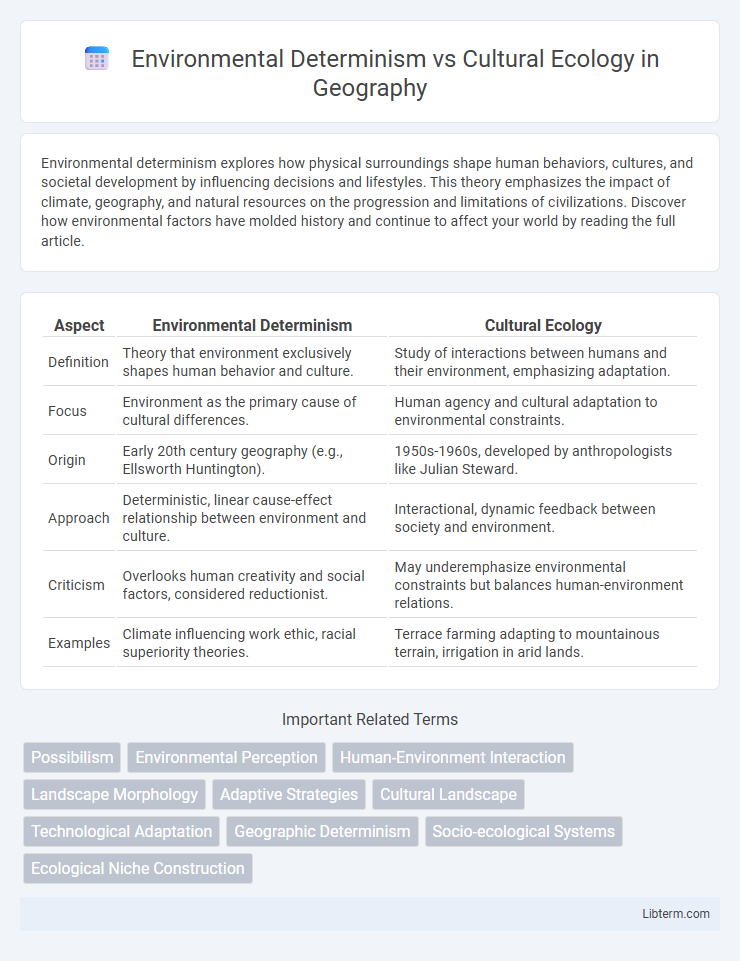Environmental determinism explores how physical surroundings shape human behaviors, cultures, and societal development by influencing decisions and lifestyles. This theory emphasizes the impact of climate, geography, and natural resources on the progression and limitations of civilizations. Discover how environmental factors have molded history and continue to affect your world by reading the full article.
Table of Comparison
| Aspect | Environmental Determinism | Cultural Ecology |
|---|---|---|
| Definition | Theory that environment exclusively shapes human behavior and culture. | Study of interactions between humans and their environment, emphasizing adaptation. |
| Focus | Environment as the primary cause of cultural differences. | Human agency and cultural adaptation to environmental constraints. |
| Origin | Early 20th century geography (e.g., Ellsworth Huntington). | 1950s-1960s, developed by anthropologists like Julian Steward. |
| Approach | Deterministic, linear cause-effect relationship between environment and culture. | Interactional, dynamic feedback between society and environment. |
| Criticism | Overlooks human creativity and social factors, considered reductionist. | May underemphasize environmental constraints but balances human-environment relations. |
| Examples | Climate influencing work ethic, racial superiority theories. | Terrace farming adapting to mountainous terrain, irrigation in arid lands. |
Introduction to Environmental Determinism and Cultural Ecology
Environmental determinism asserts that physical geography and climate are primary forces shaping human behavior and societal development, emphasizing how environmental factors constrain cultural practices. Cultural ecology explores the dynamic interactions between humans and their environment, highlighting how societies adapt culturally and technologically to specific ecological contexts. Both frameworks analyze the relationship between environment and culture but differ in attributing causality and human agency.
Historical Background of Environmental Determinism
Environmental determinism originated in the late 19th and early 20th centuries, heavily influenced by geographers like Friedrich Ratzel and Ellsworth Huntington who argued that climatic and geographical conditions shaped human cultures and societal development. This concept emphasized the environment as the primary driver of human activity and social progress, often attributing cultural differences to physical surroundings. Over time, criticisms arose due to its deterministic outlook and oversimplification, paving the way for alternative frameworks like cultural ecology that consider human agency and cultural adaptation.
Key Principles of Cultural Ecology
Cultural ecology emphasizes the adaptive strategies and practices societies develop in response to their environmental conditions, highlighting the dynamic interaction between humans and nature. It focuses on how cultural beliefs, technology, and social structures influence resource management and ecological sustainability. Unlike environmental determinism, which attributes human behavior solely to the physical environment, cultural ecology recognizes the role of human agency and cultural diversity in shaping environmental outcomes.
Major Proponents and Theoretical Foundations
Environmental determinism, championed by Friedrich Ratzel and Ellsworth Huntington, asserts that physical environment shapes human behavior and societal development, emphasizing climate and geography as ultimate drivers. Cultural ecology, advanced by Julian Steward and Claude Levi-Strauss, investigates how human cultures adapt to environmental constraints through technological innovations and social organization. Both theories underscore environment-society interactions but diverge in the degree of human agency and the complexity of ecological relationships they emphasize.
Influence of Environment on Human Societies
Environmental determinism asserts that physical geography and climate rigidly shape human behavior and societal development, emphasizing direct control of natural settings on cultural outcomes. Cultural ecology explores the dynamic interactions between human societies and their environments, highlighting adaptive strategies and environmental modifications made by communities over time. Studies integrating geographic information systems (GIS) demonstrate how environmental factors influence agricultural practices, settlement patterns, and resource management in diverse cultural contexts.
Role of Culture in Shaping Environmental Interactions
Cultural ecology emphasizes how human culture adapts to and modifies environmental conditions, highlighting the active role of cultural practices in shaping ecological interactions. Unlike environmental determinism, which views the environment as the primary force dictating human behavior, cultural ecology recognizes culture as a dynamic mediator that influences how societies utilize natural resources and respond to environmental challenges. This perspective underscores the diversity of environmental adaptations driven by distinct cultural beliefs, technologies, and social organization.
Critiques and Limitations of Environmental Determinism
Environmental determinism is often criticized for its overly simplistic view that the physical environment rigidly controls human behavior and culture, ignoring the complexity of human agency and social factors. This approach can lead to deterministic stereotypes and justify social inequalities by attributing differences in development and culture solely to environmental conditions. Cultural ecology counters these limitations by emphasizing the dynamic interactions between people and their environment, highlighting cultural adaptation and technological innovation as crucial factors shaping human societies.
Strengths and Contributions of Cultural Ecology
Cultural ecology offers a nuanced understanding of how human societies adapt to environmental challenges by emphasizing the dynamic interactions between culture and ecological systems, which provides a more flexible framework than the rigid cause-effect relationships in environmental determinism. It highlights the role of human agency, technological innovation, and social organization in shaping environmental outcomes, thus contributing to more sustainable resource management practices and resilience strategies. The approach facilitates interdisciplinary research by integrating anthropology, geography, and ecology, fostering comprehensive analyses of cultural adaptations to varied environmental conditions.
Case Studies: Comparing Approaches in Practice
Case studies comparing environmental determinism and cultural ecology reveal distinct perspectives on human-environment interactions. Environmental determinism emphasizes geographic and climatic factors shaping societies, as illustrated by Vidal de la Blache's analysis of French agricultural patterns. Cultural ecology, demonstrated in Julian Steward's studies of Native American adaptations, highlights how cultural practices actively modify environmental constraints through technology and social organization.
Contemporary Perspectives and Future Directions
Contemporary perspectives on Environmental Determinism emphasize the interplay between environmental constraints and human agency, moving beyond simplistic cause-effect interpretations to incorporate technological advancements and cultural adaptations. Cultural Ecology investigates how societies adapt to their environments through cultural practices, stressing the dynamic feedback mechanisms between ecological systems and social structures. Future directions prioritize integrating interdisciplinary approaches, leveraging geospatial technologies and climate models to address sustainability challenges and inform policy-making.
Environmental Determinism Infographic

 libterm.com
libterm.com